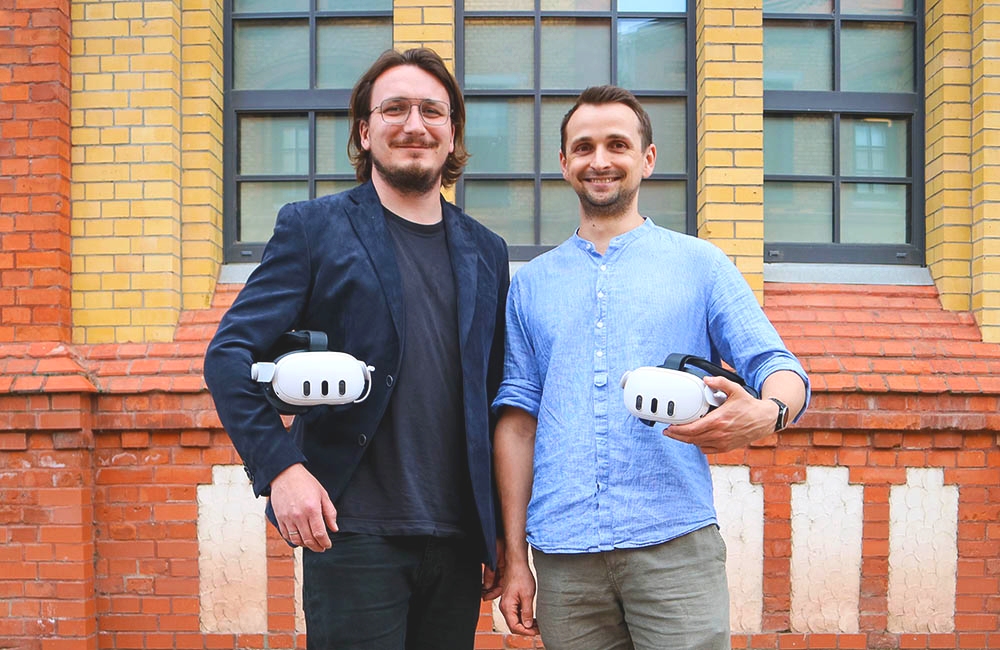NEWS
Lehrprojekt zu ganzheitlichem Lernen mit Virtual und Augmented Reality gewonnen
Am Forschungscampus STIMULATE Beteiligte haben in interdisziplinärer Zusammenarbeit die VR und AR-Anwendung „EmbryoVR“ entwickelt, die insbesondere Studierenden die Embryologie von Organsystemen und angeborene Fehlbildungen näherbringt.
Dr. Matthias Kunz (Projektleitung) und Danny Schott nutzen dazu bewährte Kollaborationsstrukturen, um eine umfassende, longitudinale Lernplattform zu schaffen. Dazu werden zunächst im Bereich Kardiologie die aktuell präklinischen im Rahmen der Anatomielehre getesteten Embryologie-Modelle in der VR-Anwendung um praxisnahe und klinische Bezüge zu angeborenen Herzfehlern ergänzt. Das Ziel ist es, Studierenden eine immersive Erfahrung zu bieten, die über die traditionellen Lehrmethoden hinausgeht. Neben dem geplanten Ausbau der Herzembryologie, soll die Anwendung um den Themenbereich der Entwicklung des Gastrointestinaltrakts erweitert werden.
Durch die Verknüpfung von präklinischer mit klinischer Lehre wird eine praxisnahe Lernerfahrung geschaffen. Dabei wird besonderer Wert auf eine nutzerfreundliche Gestaltung gelegt, die den Anforderungen von Seminaren im vorklinischen und klinischen Studienabschnitt gerecht wird. So soll die Anwendung für eine Gruppe von zunächst fünf Studierenden plus Dozent/Tutor:in erprobt werden, die im Rahmen curricularer Seminare des vorklinischen und klinischen Studienabschnitts bzw. im Skills Lab angeboten werden können. Die Qualitätssicherung erfolgt durch kontinuierliche Evaluation und wissenschaftliche Begleitung. Mit dieser Anwendung soll nicht nur das Lernen der Embryologie verbessert werden, sondern auch als Best-Practice-Beispiel für den Einsatz von VR und AR-Technologie in der medizinischen Ausbildung zu dienen.
Gefördert wird das Lehrprojekt von der Medizinische Fakultät Magdeburg, die mit einer Gesamtsumme von 100.000 Euro die Entwicklung digitaler Lehr- und Prüfungskonzepte vorantreiben und eine aktive Lehr-Lern-Kultur schaffen will. Von 18 eingereichten Projekten wurden durch ein Gutachtungsgremium und die Lehrkommission 7 Lehrprojekte für die Umsetzung ausgewählt.
Der Text wurde teilweise modifiziert vom Originalbeitrag der Otto-von-Guericke-Universität Magdeburg, Medizinischen Fakultät, Universitätsklinikum Magdeburg A. ö. R.
Teaching project on holistic learning with virtual and augmented reality won
Participants at the Research Campus STIMULATE have developed the VR and AR application "EmbryoVR" in an interdisciplinary collaboration, which brings students in particular closer to the embryology of organ systems and congenital malformations.
Dr. Matthias Kunz (project manager) and Danny Schott are using proven collaboration structures to create a comprehensive, longitudinal learning platform. To this end, the embryology models currently being tested preclinically in the field of cardiology as part of anatomy teaching will initially be supplemented in the VR application with practical and clinical references to congenital heart defects. The aim is to offer students an immersive experience that goes beyond traditional teaching methods. In addition to the planned expansion of cardiac embryology, the application will be extended to include the development of the gastrointestinal tract.
By linking preclinical and clinical teaching, a practical learning experience will be created. Particular emphasis is placed on a user-friendly design that meets the requirements of seminars in the preclinical and clinical study phases. The application is to be tested for an initial group of five students plus lecturer/tutor, which can be offered as part of curricular seminars in the preclinical and clinical study sections or in the skills lab. Quality assurance is ensured through continuous evaluation and scientific monitoring. The aim of this application is not only to improve the learning of embryology, but also to serve as a best practice example for the use of VR and AR technology in medical training.
The teaching project is being funded by the Magdeburg Faculty of Medicine, which aims to promote the development of digital teaching and examination concepts and create an active teaching and learning culture with a total of 100,000 euros. Out of 18 projects submitted, 7 teaching projects were selected for implementation by a panel of experts and the teaching commission.
The text has been partially modified from the original article by Otto-von-Guericke-University Magdeburg, Faculty of Medicine, University Hospital Magdeburg A. ö. R..
